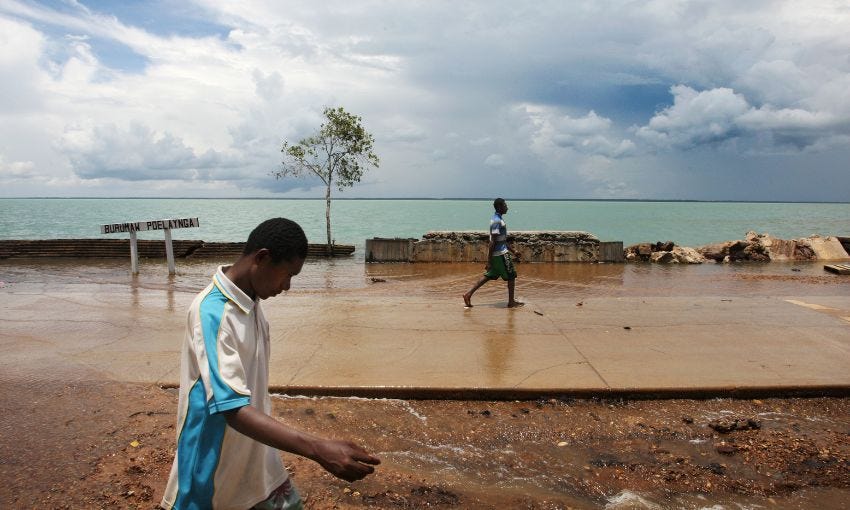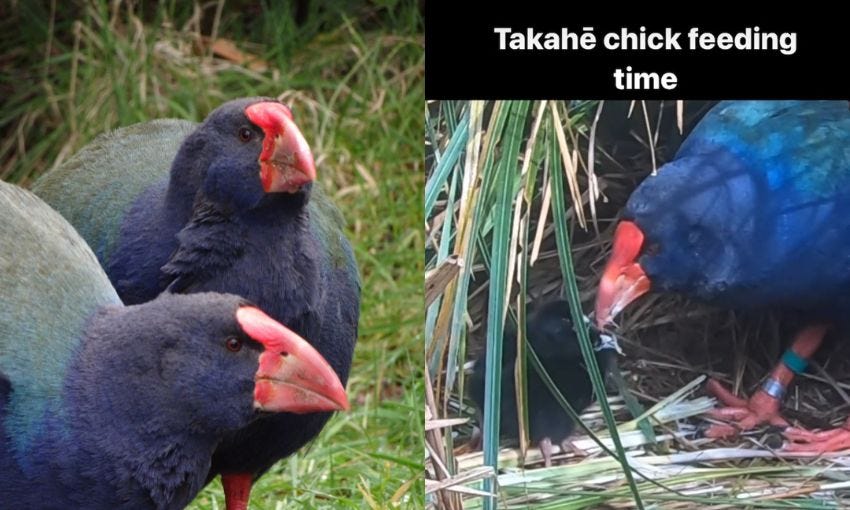This UN climate ruling is a big deal
According to the landmark decision, Australia violated the human rights of Torres Strait Islanders by failing to provide protection from climate change impacts.
Haere mai, welcome to Future Proof, brought to you by Electric Kiwi.

For the first time, a climate-related claim to the United Nations Human Rights Committee has been successful. Torres Strait Islanders – an Indigenous group of people from the tropical islands scattered off the northern tip of Queensland – claimed that the Australian government had violated their human rights by failing to take mitigation or adaptation measures against climate change. Like many low-lying Pacific islands, the Torres Strait Islands and the people living on them have been grappling with escalating, devastating climate impacts.
The UN committee decided that failing to implement adaptation measures – like a sea wall – did indeed constitute a violation of human rights, and that the Torres Strait Island communities are entitled to compensation for harm. The decision isn’t strictly legally binding, but is still significant.
The power of the human rights lens
The first case to explicitly connect climate change to human rights was led by Inuk advocate Sheila Watt-Cloutier in 2005. Watt-Cloutier, a nominee for the Nobel Peace Prize, filed a petition with the Inter-American Commission on Human Rights. In it, she argued that the impacts of climate change violated the "fundamental human rights" of Inuit people across the Arctic. The petition was unsuccessful, but sparked a shift in our climate lens: away from polar bears to people. Taking a human rights approach to climate also elevates the voices of those most vulnerable to its impacts.
Hundreds of climate cases heating up
The Torres Strait decision comes amid a growing wave of climate-related cases around the world. At the ongoing 77th session of the UN General Assembly, young climate activists from across the Pacific have been lobbying for the International Court of Justice to issue an advisory opinion on the climate-human rights connection. The initiative is spearheaded by Vanuatu and supported by more than 1,500 organisations from 130 countries. Here in Aotearoa, bold court rulings on climate cases pale in comparison those overseas. Perhaps that may change: Mike Smith’s case against seven of New Zealand’s biggest corporate climate polluters will be heard by the Supreme Court, date TBC.
Nice one. Batteries are a great way to flatten your energy usage to avoid peak times and to save solar generation for busy periods of the day. But are you getting the most value from yours?
With the MoveMaster plan, you have a huge opportunity to maximise cost savings by using off-peak periods to charge, which can also reduce your impact on the environment. For guidance, click here to find out how to optimise your battery for more efficient power usage.
Electric Kiwi is working directly with customers with batteries to analyse usage and to conduct trials on battery optimisation. If you’re an Electric Kiwi customer and would like to be part of these trials, get in touch.
Coca-Cola sponsoring Cop27?!
In utterly bizarre news, producer of large swathes of plastic in the ocean (and soft drinks) Coca-Cola, has been announced as a sponsor of the upcoming Cop27 climate talks, leaving climate activists “baffled”. Simon Coley, co-founder of Karma Drinks and All Good, is equally perplexed by the decision. He writes in The Spinoff, “Let’s challenge any company making claims about saving the planet to embrace scrutiny and get on with it.”
Revealed: How farmers are going to pay for climate-polluting cow burps (and farts)
The Government revealed its much-anticipated plan for pricing farm emissions of methane and nitrous oxide yesterday. Stuff’s climate editor Eloise Gibson has a rundown of the plan – which effectively acts like a gas levy, with no cap on emissions. This is different to what climate change minister James Shaw wanted; his preference was for a cap on emissions and a market akin to the existing Emissions Trading Scheme.
RNZ’s Russell Palmer collated responses to the announcement – which prime minister Jacinda Ardern delivered from a hay bale lectern – from farmers, environmentalists, and scientists. The Science Media Centre has gathered up a few expert reactions too. Meanwhile, an experimental farm in Taranaki is comparing conventional farming methods with a more environmentally friendly approach – with promising results.
The jet fuel made from stale cooking oil that could power your next flight
Air New Zealand has just purchased 1.2 million litres of sustainable aviation fuel made from recycled cooking oil, reports Olivia Wannan for Stuff. Will this actually help the airline achieve its net-zero 2050 ambitions? It certainly has a smaller carbon footprint than its fossil fuel equivalent – but there are some environmental complexities that make the decision to switch less straightforward (for now). Turns out scientists are pretty conflicted when it comes to biofuel – this long-read from Knowable Magazine explores the biofuel conundrum.
What on earth is degrowth?
The Spinoff’s Reweti Kohere got the lowdown on this controversial economic concept, and its connections to te ao Māori, at a session at the Auckland Climate Festival. Put simply, it’s the idea that rich countries need to shrink their economies to fit within the ecological bounds of the planet we live on. But when it comes to how we put degrowth into practice, there’s a tonne of disagreement. Even so, degrowth-esque initiatives – like France outlawing planned obsolescence – are, ahem, growing all the time.
Imagining something better
Grist has released this year’s winning short stories for their optimistic climate fiction collection, Imagine 2200: Climate Fiction for Future Ancestors. The stories (and their authors) span the globe, offering “visions of abundance, adaptation, reform, and hope”. Meanwhile, for real-life sustainable living inspiration, The New York Times Magazine (paywall) suggests we look to the small South American country of Uruguay.
Our members make the difference. Their support ensures we can continue to employ and commission diverse voices covering stories from a range of perspectives and make them freely available to all. From Spinoff stalwarts Toby Manhire and Alex Casey to young journalists like Charlotte Muru-Lanning and Shanti Mathias, our writers and contributors do valuable work that is only possible with the support of readers like you. If you can, support the team and donate today.
More stories:
New tardigrades just dropped! Scientists found these microscopic “water bears” living in Aotearoa’s glaciers.
Time to get on weed watch (no, not that kind of weed). Dr Imogen Bassett from Auckland Council runs through the botanical baddies to look out for in your garden.
Aussies aim for zero extinctions in a new biodiversity plan, but scientists are sceptical.
Eight-year-old Jasper from Havelock North Primary School tells Jesse Mulligan about the Good Caps recycling programme. Kids across Hawke’s Bay have collected nearly three tonnes of bottle caps and lids for recycling.
The world spends billions to “protect” Indigenous land. But only 17% goes to Indigenous people, Joseph Lee writes for Grist.
New rules for heat pumps, fridges and air con will come into force next year, potentially reducing our collective carbon footprint by around 160,000 tonnes (or 22,500 return flights to London).

Finally, I’m obsessed with the teeny takahē chicks at Orokonui Ecosanctuary north of Ōtepoti Dunedin – and their attentive parents, Waimarie and Bennett. The footage captured by the folks at Orokonui is adorable, and there’s nothing like some springtime babies to get you feeling hopeful!
Have an egg-cellent week,
Ellen
Got some feedback about Future Proof or topics you’d like covered? Get in touch with me at futureproof@thespinoff.co.nz












Please don't call a UN Committee's decision a "ruling" - it will be used by conspiracy theorists as evidence of their nutty idea that there is some UN drive to run the world (or something like that). It's just a Committee decision, not judicial. Sometimes terminology matters.